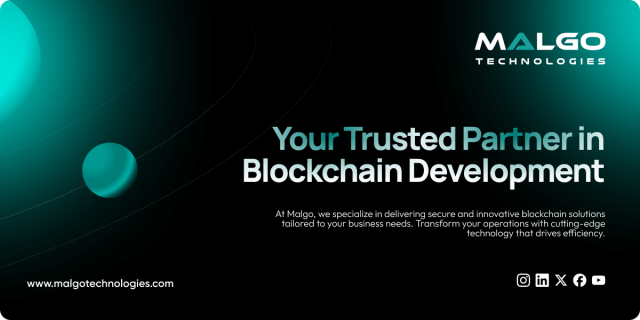A blockchain development company helps businesses build and manage software and systems that use blockchain technology. Simply put, blockchain is a special type of database, known as a distributed ledger, that stores data in blocks and links them in a chain. This structure makes the data secure, unchangeable, and transparent, as the information is shared across a network of computers, not stored in one central place. These companies assist organizations in using this technology to improve security, increase efficiency, and create new digital products. They provide various services from initial planning to building a final, functioning digital platform, ensuring that the technology suits the client's business needs.
What is Blockchain Development? Understanding the Core Technology
Blockchain development is the process of creating the architecture, protocols, and applications that operate on a blockchain or distributed ledger technology (DLT). It involves everything needed to bring a decentralized solution to life. This includes writing the underlying code for the chain itself, setting up the network rules, and programming smart contracts—self-executing digital agreements with the terms of the agreement written directly into code.
The appeal of this development process lies in solving traditional problems related to trust, data security, and the need for central authorities. By distributing data copies across many computers (nodes), a blockchain solution eliminates any single point of failure and makes data tampering practically impossible, as changing one copy requires changing all others simultaneously, which the network will reject without consensus. Developing decentralized applications (dApps) is a key part of this work, as these applications run on the blockchain and offer users a transparent, censorship-resistant way to interact with a service or system.
Accelerate Growth with Blockchain Solutions – Start Now!
Essential Services Provided by a Blockchain Development Agency
A blockchain development agency offers a wide array of services that cover the entire lifecycle of a decentralized project. These services are often categorized by the type of solution or the stage of development. Clients seeking to use custom blockchain solutions usually look for a partner that can provide both high-level strategy and low-level technical execution.
Blockchain Consulting and Strategic Planning
Before any code is written, a good company offers blockchain consulting to determine if the technology is the right fit for the problem at hand. This involves deeply analyzing a business's current operations and identifying specific use cases where distributed ledger technology offers clear advantages over traditional databases. For example, a supply chain company might need verifiable provenance records, making blockchain a suitable choice.
The planning stage also includes helping a client choose the correct blockchain platform—such as Ethereum, Hyperledger Fabric, or Solana—and the appropriate consensus mechanism (like Proof of Stake or Proof of Authority) that will govern how the network agrees on new transactions. This strategic clarity is a foundational step for any successful project.
Decentralized Application (dApp) Development
dApp development is the most visible service. Decentralized applications are software programs that run on a blockchain network instead of a single server. A dApp development firm creates the entire application, from the user-facing interface to the backend logic executed by smart contracts. They build applications for various industries, including:
-
Finance (DeFi): Building decentralized exchanges, lending protocols, and payment systems.
-
Gaming: Creating Play-to-Earn (P2E) blockchain games where digital items are owned by the players.
-
Supply Chain: Developing solutions for tracking goods and verifying product authenticity.
-
Identity Management: Building secure systems for digital identification.
Smart Contract Development and Auditing
Smart contracts are the backbone of most custom blockchain development projects. They automate agreements and transactions without the need for an intermediary. The development company writes the contract code, often using languages like Solidity, ensuring it is logically sound and bug-free.
A crucial service here is smart contract auditing. Since smart contracts handle value and cannot be changed once deployed, they must be secure. An audit involves a thorough code review by security experts to identify vulnerabilities that could be exploited, a necessary step for maintaining the trustworthiness of the final product.
The Process of Building a Custom Blockchain Solution
Creating a custom blockchain solution is a multi-step process that moves from abstract ideas to a fully functional digital system. A reputable blockchain development company follows a clear methodology to reduce risk and ensure the final product meets the client's precise business needs.
Initial Discovery and Proof of Concept (PoC)
The process starts with discovery, where the team works to understand the project's goals, scope, and technical requirements. The first physical output is usually a Proof of Concept (PoC). A PoC is a small, working prototype used to demonstrate the feasibility of the idea. It proves that the core concept can function using blockchain technology and provides early validation for the project's technical direction before large resources are committed.
Architecture Design and Consensus Selection
After the concept is proven, the architecture of the blockchain is designed. This involves deciding whether to build a new blockchain (Layer 1), build on an existing one, or use an off-chain solution (Layer 2) to improve transaction speed. The company defines the network rules, including who can join (public or permissioned network) and the consensus mechanism that all nodes will use to agree on the state of the ledger. This design sets the groundwork for the platform's security, speed, and scalability.
Development, Testing, and Quality Assurance
With the architecture in place, the core development begins. Developers write the smart contracts, build the necessary APIs (Application Programming Interfaces) to connect the blockchain to other systems, and create the user interface.
Throughout this phase, rigorous testing and Quality Assurance (QA) are mandatory. This includes:
-
Unit Testing: Testing individual components and smart contract functions.
-
Integration Testing: Checking that the smart contracts, APIs, and front-end interface work together smoothly.
-
Security Testing: Performing simulations of attacks to identify and fix security flaws before deployment.
Deployment and Post-Launch Support
The final step is deployment, which involves launching the verified solution onto a live network (mainnet). This requires careful coordination to ensure a smooth transition. Crucially, the work doesn't stop here. A good blockchain services provider offers post-launch support and maintenance. This includes continuous network monitoring, applying necessary updates, fixing any issues that arise, and helping the client plan for future improvements and feature additions, ensuring the solution remains up-to-date and operational.
Ensuring Security and Scalability in Blockchain Projects
Two of the biggest considerations in blockchain development are security and scalability. A successful blockchain solution must be highly secure to protect unchangeable data and fast enough to handle a growing volume of transactions.
How Blockchain Development Companies Guarantee Security
Security is foundational to the value proposition of a blockchain platform. Companies employ multiple strategies to maintain a high level of security:
-
Cryptographic Protocols: They use proven cryptographic methods to secure data within the blocks, making it nearly impossible to alter historical records.
-
Smart Contract Audits: As mentioned earlier, code review and auditing by specialized teams are performed to prevent logical flaws or backdoors in the self-executing contracts.
-
Secure Key Management: They help clients establish strong key management systems to protect the cryptographic private keys that control access to digital assets and wallets. Losing a private key means losing access to assets forever, so secure storage and recovery protocols are essential.
-
Identity and Access Control: For private or permissioned blockchains, strict controls are put in place to verify the identity of all network participants and limit their permissions, adding a layer of conventional security over the decentralized structure.
Addressing Scalability and Performance Challenges
Scalability refers to a blockchain's ability to handle an increasing number of transactions quickly and efficiently without slowing down. Some popular public blockchains can process a limited number of transactions per second, which is a major constraint for large-scale business use. Blockchain development services address this through several architectural choices:
-
Layer 2 Solutions: Building protocols on top of the main chain that handle most transactions off-chain before settling them back on the main network. This dramatically increases transaction throughput.
-
Optimized Consensus Mechanisms: Selecting or creating consensus algorithms that are faster and more efficient than older, energy-intensive methods like Proof of Work. Proof of Stake and similar protocols are designed for higher transaction speeds.
-
Sharding: A method where the network is split into smaller, interconnected parts called 'shards.' Each shard processes a fraction of the transactions simultaneously, which allows the network as a whole to handle a greater volume of activity.
Key Applications of Custom Blockchain Development Services
The use cases for custom blockchain development span nearly every industry where trust, transparency, and data integrity are paramount. A blockchain development service provider adapts the underlying technology to fit diverse real-world problems.
Decentralized Finance (DeFi) Solutions
DeFi development focuses on recreating traditional financial services—like lending, borrowing, trading, and insurance—in a decentralized, non-custodial way. This means users keep control of their assets without needing a bank or other intermediary. Companies build decentralized exchanges (DEXs), automated market makers, and stablecoin systems, using smart contracts to automate all transactions and financial logic.
Non-Fungible Token (NFT) Platform Development
NFTs are unique digital assets, recorded on a blockchain, that can represent ownership of a digital or physical item. NFT platform development involves creating the marketplace, minting contracts, and backend infrastructure needed to buy, sell, and trade these tokens. This is widely used in art, collectibles, music, and ticketing, giving creators new ways to manage ownership and royalties.
Enterprise Blockchain Solutions
Many large businesses use enterprise blockchain solutions to improve internal operations or supply chain management. These are often permissioned blockchains where access is restricted to known business partners.
-
Supply Chain Management: Tracking products from origin to consumer to prevent fraud and quickly identify the source of contamination or issues.
-
Cross-Border Payments: Creating more efficient, lower-cost, and faster systems for international money transfers.
-
Digital Voting Systems: Developing highly secure, transparent, and auditable voting platforms where results cannot be manipulated.
The Role of a Blockchain Development Firm in Modern Business
A blockchain development firm serves as a specialized partner, providing the technical expertise and practical experience required to move from a conventional business model to a decentralized one. They help businesses not only build the technology but also understand the operational and regulatory implications.
Fostering Transparency and Trust
The fundamental characteristic of blockchain—its shared, unchangeable ledger—automatically fosters trustworthiness among all participants in a network. By using a blockchain development company to build a solution, an organization commits to a higher level of data transparency and accountability. This is especially valuable in B2B transactions or multi-party systems where no single entity trusts all others.
Adopting Distributed Ledger Technology for Longevity
For businesses looking for long-term strategic advantage, adopting distributed ledger technology (DLT) is a way to future-proof operations. The development partner offers continuous support and guidance on adopting new standards, integrating with emerging protocols, and scaling the platform to meet future demands. This proactive approach ensures the initial blockchain solution remains a valuable asset over time, capable of adapting to the quickly moving digital environment. The company's authoritativeness in the domain allows clients to rely on their advice for major technology decisions.
Long-Term Maintenance and Support for Blockchain Systems
The work of a blockchain development service provider continues long after the initial launch. Long-term support is crucial for the ongoing success and security of any live blockchain system.
System Monitoring and Upgrades
Post-deployment, the company provides system monitoring to continuously check the network's health, performance, and security. As the network matures, software patches and necessary upgrades must be applied to the core protocol, smart contracts, and dApps to maintain optimal performance and security against new threats. Regular updates are part of the agreement to keep the solution competitive and aligned with the latest security standards.
Bug Fixes and Incident Response
Inevitably, all complex software requires occasional bug fixes. A dedicated support team is responsible for rapidly addressing any issues, from minor glitches in the user interface to critical errors in a smart contract's execution. Incident response for a blockchain system involves quickly isolating and neutralizing any discovered vulnerabilities to prevent data loss or manipulation, further upholding the platform's trustworthiness.
Planning for Feature Expansion
As the business grows and user needs evolve, the blockchain platform must also grow. The development partner works with the client to plan and execute feature expansion. This might involve adding a new type of token, integrating with another external data source, or implementing a new governance model for the network. This consultative approach ensures the original investment in blockchain development continues to yield returns through ongoing innovation.






